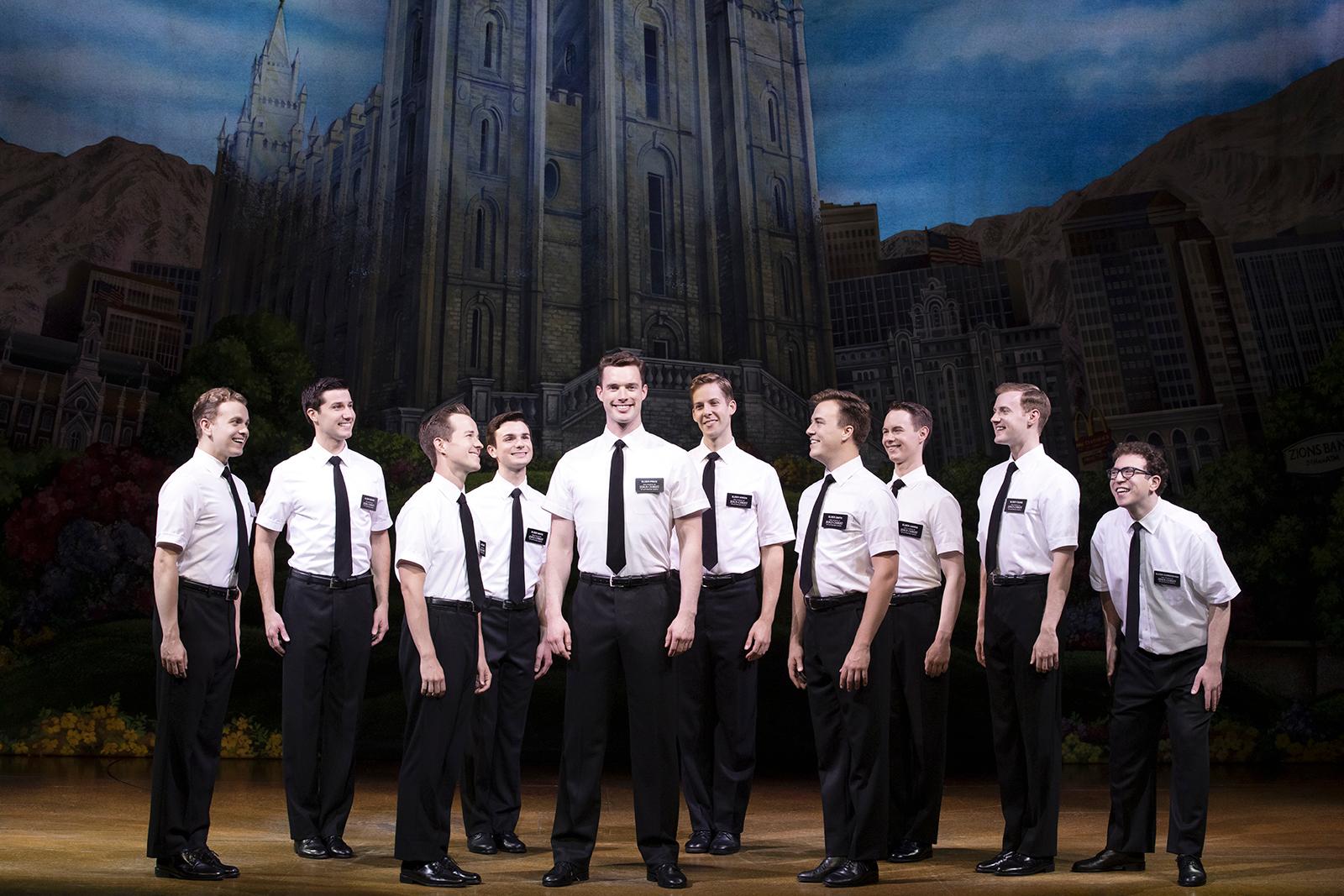Theater review: ‘The Book of Mormon’ completes mission to bring audiences laughter
(Courtesy of Julieta Cervantes)
"The Book of Mormon"
Feb. 18 - March 29
Ahmanson Theatre
Price Varies
By Sean Moore
Feb. 24, 2020 10:28 p.m.
Ahmanson Theatre said “Hello” to the most amazing book Friday night.
Touring in Los Angeles through March 29, “The Book of Mormon” delivers on its promise of well-crafted laughs but falls slightly short in its characters and finale.
Written by the witty, oftentimes controversial minds behind South Park, Matt Stone and Trey Parker, along with the additional talent from musical songwriter Robert Lopez, the show gains most of its notoriety from its tongue-in-cheek satirization of the real-life Mormon church. Although listening to “The Book of Mormon” on its own illustrates some of the irreverent humor in the show, the excellent choreography and costume designs elevate the musical to a new height.
The story primarily follows the adventures of two Mormon missionaries who are sent to a war-torn village in Uganda to convert the townsfolk to The Church of Jesus Christ of Latter-day Saints. They find their task near impossible, having their faith constantly challenged as they see the struggles of the Ugandan tribe.
The two main Mormons, the popular, “perfect,” Elder Price (Liam Tobin) and his comedic foil, Elder Cunningham (Jordan Matthew Brown), begin the show with arguably one of the most popular songs from the play. “Hello” introduces the two protagonists through an ensemble of Mormon followers ringing doorbells to share with people their book. The song sets the tone for the rest of the production as the story is riddled with adult, raunchy humor juxtaposed with an upbeat score.
[Related: Musical review: While spectacularly produced, ‘Frozen’ fails to bring anything new to the table]
Along with spoofing other pop culture references – after all, “Hakuna Matata” makes its way into “Hasa Diga Eebowai” – the story maintains moments of topical humor as well with songs like “Turn It Off,” which introduces one of the funniest side characters in the story. In fact, the number has Elder McKinley (Andy Huntington Jones), who had once closeted away his gay thoughts because it’s not allowed in the church, tap dancing his way across the stage in a pink, bedazzled vest.
But while “The Book of Mormon” is viewed as a comedy, it does have its emotional moments. “Hasa Diga Eebowai Reprised” takes the initially irreverent song and transforms it into a cry for help while “Tomorrow is a Latter-Day” has Elder Price and Elder Cunningham discovering clarity about what it means to accept change even if that means moving away from tradition. In these moments, “Book of Mormon” is able to transcend comedy and reach an unexpected emotional tone.
The songs are not the only aspect of the show to strike this balance, as the cast also has to demonstrate tremendous acting prowess to deliver the humor and heart that the show demands. One of the best performances from the production originated with the daughter of the leader of the Ugandan tribe, Nabulungi (Alyah Chanelle Scott).
She utilizes her wide vocal range throughout the play while also maintaining her character’s Ugandan accent. Scott does this with ease as she dreams about journeying to the Mormon paradise of “Sal Tlay Ka Siti” (Salt Lake City), and eagerly sings about her first time being baptized, making for a standout performance from an already exceptional cast.
[Related: Theater review: ‘Revenge Song’ tactfully uses drama and comedy to explore identity, sexuality]
However, despite the musical range the cast brings to the table, “The Book of Mormon” is not entirely perfect. There are moments when the crude humor feels slightly childish, and the musical itself becomes cluttered by an excess of pop culture Easter eggs. But the main issue stems from its undeserved resolution and character development.
The musical felt like it glossed over the climax, rushing to the resolution without adding any gravity to what was supposed to be the culmination of everything that had happened in the story so far. The finale also felt too easy and the characters got exactly what they wanted without having to deal with many repercussions.
Elder Price also arguably doesn’t deserve the growth he achieves as someone who begins the story as an overconfident Mormon, angry that he is stuck in Uganda instead of his dream location in “the best place in the world,” Orlando, Florida. He eventually becomes more understanding and compassionate about Elder Cunningham during “Tomorrow is a Latter-Day,” but the sudden personality shift from five minutes earlier was jarring to the senses. Meanwhile, Elder Cunningham was on the other end of the spectrum as he received minimal character development and was praised for lying at the end of the story.
But character faults aside, the musical’s production value makes it no wonder why it has become one of the main examples of musical comedy within the last decade because it is unafraid of delving into humor that some may see as controversial. The show has remained popular for over nine years, and its combination of outstanding humor and mesmerizing choreography guarantees that it’s likely to share its story for years to come.
With “The Book of Mormon,” there’s no need to travel to Utah to restore faith in musical theater.
